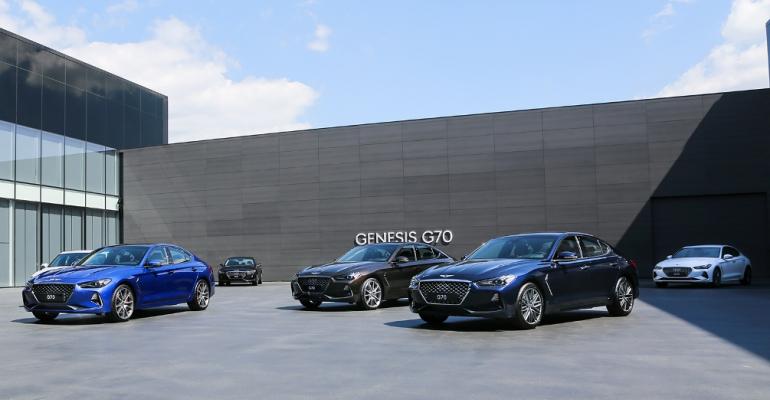SEOUL – Genesis stages the global launch of the third vehicle in its lineup – the G70 midsize sedan – here, where the automaker enjoys an unquestionable home-team advantage.
South Korean automaker Hyundai two years ago spun off Genesis as a stand-alone luxury brand that now is working to establish itself worldwide. The ambitious nameplate-awareness effort especially focuses on the home market where Hyundai vehicles dominate the roadways.
“The launch of the Genesis G70 is an important milestone for our brand,” says Manfred Fitzgerald, head of the Genesis division. “We deliberately chose Seoul, as this is our place of origin.”
Dubbed “G70: Seoul 2017” the sendup includes a music concert at Olympic Park, an event attracting a crowd of about 15,000 (mostly young people who do not seem like Genesis’ target audience) and a press conference attended by about 300 international journalists (some of them from countries such as Lebanon where Genesis has no immediate plans to sell its new car).
The media event is held at a newly built Genesis design center on the sprawling Hyundai R&D center outside of Seoul.
“We will continue to focus our R&D efforts on the development and expansion of the Genesis brand,” says Woong-Chul Yang, a Hyundai Motor Group vice chairman. “It is a great point of pride to have Genesis showcase what a true luxury brand of Korean origin can present to our discerning customers.”
The G70 first goes on sale this month in South Korea, in the U.S. around March and then in other countries to be announced.
“One of the important things is to really get our foot down in the home market, to be relevant here,” Fitzgerald says. “People here are very proud of their first Korean luxury brand. We want to build on that. Having a strong domestic market is a key to success in other markets.”
The new vehicle joins the G80 and G90, both large size sedans, in the Genesis lineup that currently is devoid of SUVs or CUVs, hot sellers globally and particularly in the U.S.
But with its sedan portfolio now complete, Genesis plans to add utility vehicles to the lineup in coming years. That includes the GV80 that debuted at the New York International Auto Show this year.
“Without a doubt,” SUVs, CUVs and pickup trucks combined outsell cars in the U.S., says Erwin Raphael, Genesis general manager in the U.S. “But cars still are a very large segment. There are a lot of sedans being sold, and in the luxury segment, this (midsize sedans) is the highest volume. So this plays to our strength right now.

“The CUV question boils down to a combination of which CUV and when and also how the market shifts,” he adds. “The CUVs will do very well. We just must be very competitive in each segment we are in.”
Andrew DeFeo says he and fellow Genesis dealers would love to have a CUV in their showrooms now, but adds the impending GV80 will be worth the wait.
“The technology planned for them will be head and shoulder above what’s in the marketplace now,” says DeFeo, a St. Augustine, FL, dealer who heads the Hyundai dealer council in the U.S. “Technology, and particularly consumer-focused technology is a big part of the Genesis brand.”
Genesis plans a 6-vehicle lineup by 2021, Fitzgerald says. As a separate brand, Genesis has sold more than 150,000 units to date, with Korea and the U.S. as primary markets. It hopes to sell about 15,000 G70s a year in its home market.
The G70 will take particular aim at the Mercedes-Benz C-Class, BMW 3-Series and the Audi A4. “We’ll compete head-to-head with the others,” Raphael says.
Genesis touts the rear-wheel-drive G70 as both athletic and posh. The G70 offers three powertrains: a 3.3L V-6 turbo, a 2.0L I-4 turbo and a2.2L I-4 diesel.
As to potential G70 buyers, he says, “We definitely see the demographics shifting to younger and to people who are more open to different, new ideas, new products. They’re not so attached to a particular brand. Our job is to get them attached to ours.”
Genesis originated as an upscale Hyundai model, not as a separate division. The Hyundai Genesis debuted in the U.S. in a horrible year, 2008, the start of a major recession that decimated auto sales.
In 2009, John Krafcik, then head of Hyundai Motor America, touted the vehicle as an affordable upscale sedan that appealed to consumers who wanted luxury cars but who also wanted “to be less conspicuous, less ostentatious” during the recessionary hard times that affected millions of people.
“I think it’s a bit of reverse social stigma,” he said of the apparent inconspicuous consumption.
Now, the stand-alone Genesis brand is urging dealers to build separate facilities to sell the luxury vehicles. Currently, they are sold at Hyundai dealerships, although in designated sections.
“We’ll see if Genesis can make a go of it as a luxury brand,” says a Hyundai dealer. “It’s a risk.”
Still, it’s one he’s willing to partake in. He’s applied to become a Genesis standalone dealer. Of Hyundai’s 800 U.S. dealers, a subset of 350 sells Genesis models. Raphael would like to see that number trimmed down to increase throughput – average sales per store, a key profit indicator.
Introducing a luxury car and then a luxury brand are huge leaps for Hyundai. It entered the U.S. market three decades ago with the Excel, a low-priced little econobox.
There’s the story of a Hyundai salesman who in 1986 went on a test drive with a customer in an Excel and had to turn off the air conditioner to get enough power to go up a hill, Kevin Reilly, dealer principal at Alexandria Hyundai in the Washington D.C. area, says in citing how far Hyundai and its brands have come.
In the past, foreign auto companies typically entered the U.S. with modest products, Raphael notes. “They all started at a point where none of them would today be proud of the initial product. They’ve all improved dramatically.”
Today, Genesis, Hyundai and sister brand Kia share top-brand honors (Kia No.1, Genesis No.2, Hyundai No.8) in J.D. Powers' latest initial quality survey.
In some respects, Genesis is taking a page from the Toyota playbook on how to establish a luxury-car brand in the U.S. Toyota introduced Lexus in 1989, and it is now the third best-selling premium brand in the U.S., behind Mercedes and BMW.
As an upstart, Lexus positioned itself as offering comparable luxury and quality, yet at a lower cost. It was careful to finesse that by not billing itself as an upscale car at a bargain-basement price, just one that was lower than its competitors.
Genesis has yet to announce G70 pricing in the U.S. In Korea, it starts at about $33,000, but “I wouldn’t read too much into that because that figure is configured for Korea, taxes and other considerations,” Raphael says. The more upmarket G80 starts at under $50,000.
When Japanese automakers first introduced luxury divisions, they did so in the U.S. only and “sort of ignored their home markets at first,” he says. “Genesis isn’t doing that. This is a holistic global brand from the ground up. That’s a differentiator.”
The in-house decision was to establish an independent luxury brand and a separate division that’s not under the Hyundai umbrella, Fitzgerald says, referring to the formal creation of a separate Genesis division earlier this year. “Definitely we’re the new kid on the block.”





